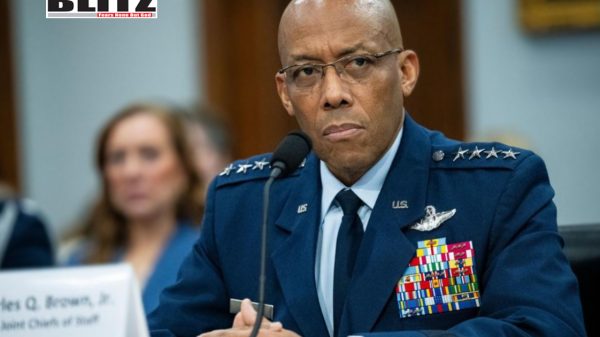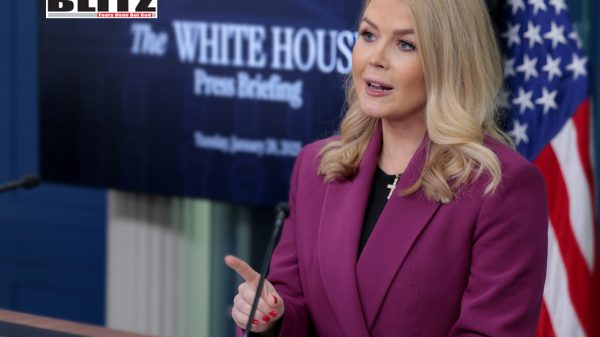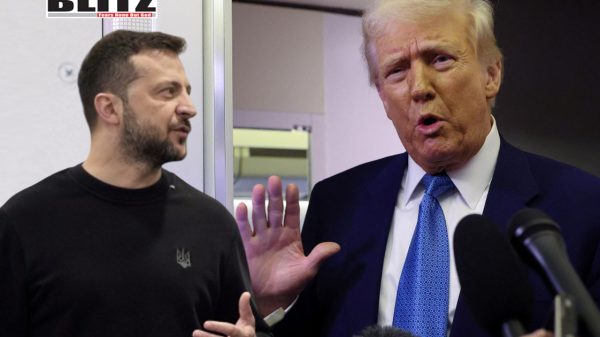Trump fires General Charles Brown over support for black lives matter
- Update Time : Monday, February 24, 2025

US President Donald Trump has dismissed General Charles Brown, the Chairman of the Joint Chiefs of Staff, marking a significant shift in military leadership and policy. Brown, the second African-American to hold the position, had openly supported the Black Lives Matter (BLM) movement during nationwide protests in 2020. His term, which was supposed to end in September 2027, has been cut short, aligning with Trump’s broader efforts to dismantle diversity, equity, and inclusion (DEI) initiatives within the federal government and armed forces.
The president announced Brown’s dismissal on February 22 through his Truth Social platform, expressing gratitude for the general’s service. Brown’s removal is part of a broader campaign to reshape the culture of the US military, aligning it with Trump’s emphasis on meritocracy and traditional values. This move has sparked heated debate, with critics accusing the administration of politicizing the military and undermining diversity.
Brown’s tenure was marked by his advocacy for racial equality within the military. In a 2020 video address to the Air Force, he shared personal experiences of racial bias, aligning himself with the broader BLM movement, which emerged in response to the deaths of Michael Brown, Eric Garner, and George Floyd. The movement’s supporters argue that systemic racism pervades American society, including law enforcement and the military. Conversely, critics contend that BLM promotes division and social unrest.
Trump’s decision to dismiss Brown appears to reflect his administration’s broader stance against what it perceives as progressive overreach within the military. Since taking office in January, Trump has rolled back numerous DEI programs implemented during Joe Biden’s presidency. He has also signed an executive order prohibiting individuals with gender dysphoria from serving in the armed forces and mandated that the federal government recognize only two genders-male and female.
Brown’s removal was accompanied by the dismissal of five additional Pentagon officials, including Admiral Lisa Franchetti, the first woman to command the US Navy, and Admiral Linda Fagan, the first female Coast Guard Commandant. These firings suggest a concerted effort to realign the military’s leadership with Trump’s vision of a more traditional and merit-based institution.
US Secretary of Defense Pete Hegseth, who assumed his role in January, has echoed this sentiment. Addressing Pentagon staff earlier this month, Hegseth dismissed the phrase “diversity is our strength” as the “dumbest” in military history. He emphasized that the military will judge individuals based on their merit rather than their identity, signaling a shift away from DEI-driven policies.
Hegseth’s criticism of Brown predates his appointment as defense secretary. In a November appearance on the “Shawn Ryan Show,” Hegseth argued that Brown had overly emphasized race during his tenure, suggesting that his approach had undermined the military’s focus on merit and performance.
Trump’s decision has drawn sharp criticism from Democratic lawmakers and civil rights advocates. Senator Jack Reed, the ranking Democrat on the Senate Armed Services Committee, condemned the firings as a political loyalty test that undermines the military’s professionalism. Reed warned that dismissing leaders based on their views on diversity and gender sets a dangerous precedent.
Representative Seth Moulton, a Democrat and Marine Corps veteran, echoed these concerns, calling the decision “un-American and unpatriotic.” Moulton argued that Trump’s actions politicize the military and jeopardize its ability to function as a nonpartisan institution dedicated to defending the nation.
Civil rights organizations have also expressed alarm over the broader rollback of DEI programs, arguing that these initiatives are essential for creating an inclusive and effective military. Critics contend that eliminating these programs will discourage minorities and marginalized groups from pursuing military careers, ultimately weakening the armed forces.
Despite the backlash, Trump’s actions have garnered support from conservative lawmakers and commentators who view DEI initiatives as divisive and detrimental to military cohesion. They argue that prioritizing identity politics over merit has compromised the military’s effectiveness and morale.
Proponents of Trump’s approach assert that the military should focus on its core mission of defending the nation, rather than serving as a platform for social experimentation. They believe that emphasizing individual merit will enhance military performance and foster a more unified and resilient force.
The dismissal of General Brown and other Pentagon officials marks a pivotal moment in the ongoing debate over the role of diversity and inclusion in the US military. Under Biden, the Pentagon implemented numerous initiatives aimed at addressing racial and gender disparities, reflecting broader societal shifts toward greater equity.
Trump’s reversal of these policies signals a return to a more traditional military culture, emphasizing discipline, merit, and cohesion. While supporters view this as a necessary correction, critics fear that it will alienate minority service members and undermine the military’s ability to attract and retain diverse talent.
The firing of General Charles Brown underscores the profound ideological divide shaping American politics and society. For Trump and his supporters, the military must prioritize performance and unity, free from what they see as the divisive influence of identity politics. For critics, dismantling DEI programs represents a step backward, undermining efforts to create a military that reflects the nation’s diversity.
As the US navigates these cultural and political tensions, the future of military leadership and its approach to diversity will remain a contentious and closely watched issue. The outcome of this debate will not only shape the composition of the armed forces but also influence broader societal attitudes toward race, gender, and equality in the years to come.












Leave a Reply